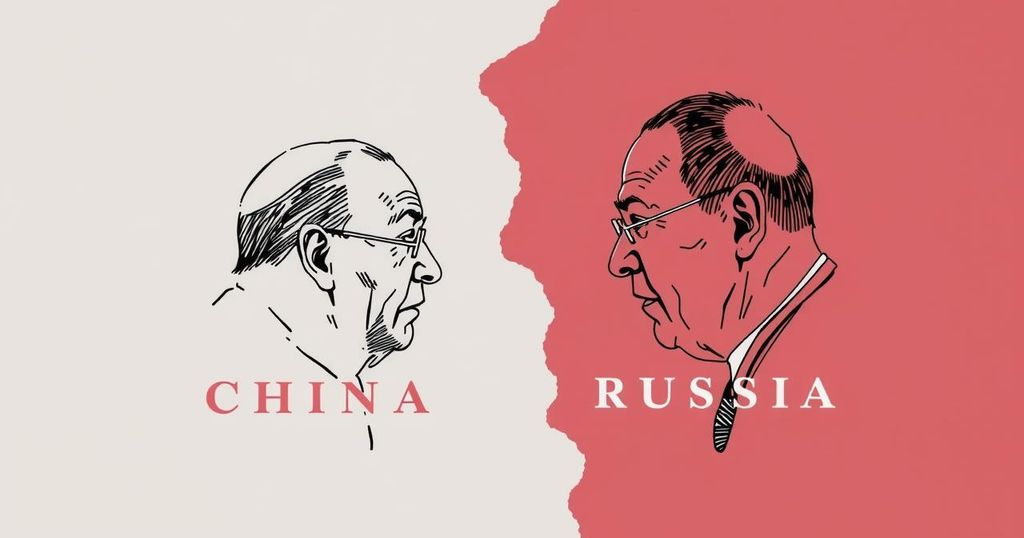Iranian Press Critiques China and Russia’s Response to Israeli Strikes
Iranian press outlets have criticized China and Russia for their insufficient and delayed responses to Israeli military attacks on Iran. As Tehran relies on these countries amid increasing Western sanctions, there is growing disappointment over their lack of support. Additionally, internal divisions among Iranian political factions are highlighted as critical obstacles to effective diplomacy. The controversy surrounding an Afghan advisor’s invitation further exacerbates the challenges to water rights and environmental issues faced by Iran.
Recent criticism has been directed towards China and Russia regarding their inadequate responses to Israeli attacks on Iran. Iranian media outlets have expressed frustration over the perceived delay and lack of condemnation from these nations. The Ham-Mihan daily criticized that it took three days for China to respond to the Israeli military actions, while Russia weighed in only hours after the attacks without issuing a clear condemnation. Such reactions fall short of expectations, especially considering the strategic relationships developed between Tehran, Moscow, and Beijing in recent years. In the wake of increased Western sanctions, Iran has sought to strengthen alliances with Russia and China, culminating in economic arrangements, including the sale of oil to China. However, these efforts face scrutiny amid rising tensions involving direct confrontations with Israel. A newspaper aligned with hardline factions in Iran has called for more aggressive military strategies against Israeli interests, stressing that retaliatory attacks are necessary for maintaining regional security. Reports have suggested targets for military action, including sites in Israel, Additionally, the internal political landscape poses significant challenges for Iranian diplomacy. Hashmatullah Falahat Pishe, a former legislator, highlighted the detrimental impact of extremist groups within Iran on foreign policy efforts. He noted the importance of a unified domestic political front in successfully navigating international relations. Pishe pointed out the obstacles presented by internal conflicts and emphasized the necessity for the government to address these issues comprehensively to enhance diplomatic efficacy. Furthermore, the invitation extended to Farugh Azam, an advisor from Afghanistan, has ignited controversy in Iran. Given his advocacy for limitations on water flow from the Helmand River to Iran, his presence has been criticized as undermining Iran’s water rights, which are increasingly precarious due to ongoing environmental degradation in Lake Hamoun. Experts have voiced concerns over signaling support for an individual whose policies could exacerbate the challenges Iran faces in securing its essential water resources. In conclusion, the responses from China and Russia to Israeli actions have attracted significant dissatisfaction within Iran, reflecting broader discontent with international relations. Simultaneously, the internal dynamics of Iranian politics, particularly those involving extremist factions, and the contentious water rights issues with Afghanistan further complicate Iran’s efforts to establish a strong diplomatic stance in the region.
The Iranian press has displayed considerable frustration towards the responses of China and Russia following Israeli military strikes on Iranian territory. As Iran has increasingly turned towards these nations for economic support amidst Western sanctions, the lack of timely and robust support from its allies has raised questions about the reliability of these partnerships. Moreover, there are ongoing internal challenges within Iran concerning extremist factions that undermine cohesive foreign policy efforts, complicating diplomatic initiatives.
In summary, the criticisms aimed at China and Russia for their lackluster responses to Israeli attacks reveal deep-seated frustrations within Iran regarding international allyship. Coupled with internal divisions that hinder diplomatic progress, the situation underscores the complexity of Iran’s geopolitical relationships and domestic politics. Furthermore, the contentious issue of water rights with Afghanistan adds another layer of challenge to Iran’s national interests, highlighting the urgent need for coherent and effective governmental strategies.
Original Source: www.middleeasteye.net





Post Comment